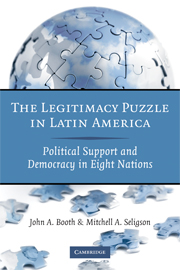Book contents
- Frontmatter
- Contents
- List of Figures
- List of Tables
- Preface
- 1 The Legitimacy Puzzles
- 2 The Structure of Legitimacy
- 3 Countries in the Study
- 4 The Sources of Political Legitimacy
- 5 Legitimacy and Political Participation
- 6 Legitimacy and Negative Political Capital
- 7 Legitimacy and Democratic Values
- 8 The Sky Is Not Falling: The Puzzle Solved
- Appendix A Supporting Data and Analyses for Chapters 1–5
- Appendix B Variables Used in the Analyses
- Appendix C System-level Performance Measures
- Appendix D Nonsampling Errors, Sampling Errors, and Design Effects for the Eight-Nation Survey
- Appendix E Method of Constructing the Legitimacy Factor Scores
- References
- About the Authors
- Index
2 - The Structure of Legitimacy
Published online by Cambridge University Press: 05 June 2012
- Frontmatter
- Contents
- List of Figures
- List of Tables
- Preface
- 1 The Legitimacy Puzzles
- 2 The Structure of Legitimacy
- 3 Countries in the Study
- 4 The Sources of Political Legitimacy
- 5 Legitimacy and Political Participation
- 6 Legitimacy and Negative Political Capital
- 7 Legitimacy and Democratic Values
- 8 The Sky Is Not Falling: The Puzzle Solved
- Appendix A Supporting Data and Analyses for Chapters 1–5
- Appendix B Variables Used in the Analyses
- Appendix C System-level Performance Measures
- Appendix D Nonsampling Errors, Sampling Errors, and Design Effects for the Eight-Nation Survey
- Appendix E Method of Constructing the Legitimacy Factor Scores
- References
- About the Authors
- Index
Summary
In Chapter 1 we reported on prior research showing that legitimacy in Costa Rica in 2002 manifested distinct dimensions organized around specific referents such as regime principles, regime performance, regime institutions, and political actors' performance. Having confirmed that the Easton/Norris/Dalton view of legitimacy had construct validity in at least one Latin American nation, we now move on to explore the structure of legitimacy in a broader comparative context.
The field of comparative politics has long been concerned with the problem of cross-national validity of its concepts, including those that emerge from survey research. The classic Civic Culture (Almond and Verba 1963) and Civic Culture Revisited (Almond and Verba 1980) provided readers an extended and cautionary discussion of cross-national comparability of survey questions. Unfortunately, despite this early concern, nearly all cross-national survey research today begins with the assumption that survey questions do, indeed, “travel” and that concepts defined in one context work in all others. This assumption, recent research has shown, is probably unrealistic, at least to some degree, in surveys in which there is sharp variation in the cultural traditions of the nations included in the surveys. A recent paper, for example, carries out a series of structural equation models using data from two different cross-national surveys and finds evidence of nonequivalence of measures (Elkins and Sides 2007). As already noted, and as we will argue in greater depth in Chapter 3, our study has the advantage of working with a set of nations that have many long-term cultural similarities.
- Type
- Chapter
- Information
- The Legitimacy Puzzle in Latin AmericaPolitical Support and Democracy in Eight Nations, pp. 38 - 65Publisher: Cambridge University PressPrint publication year: 2009



